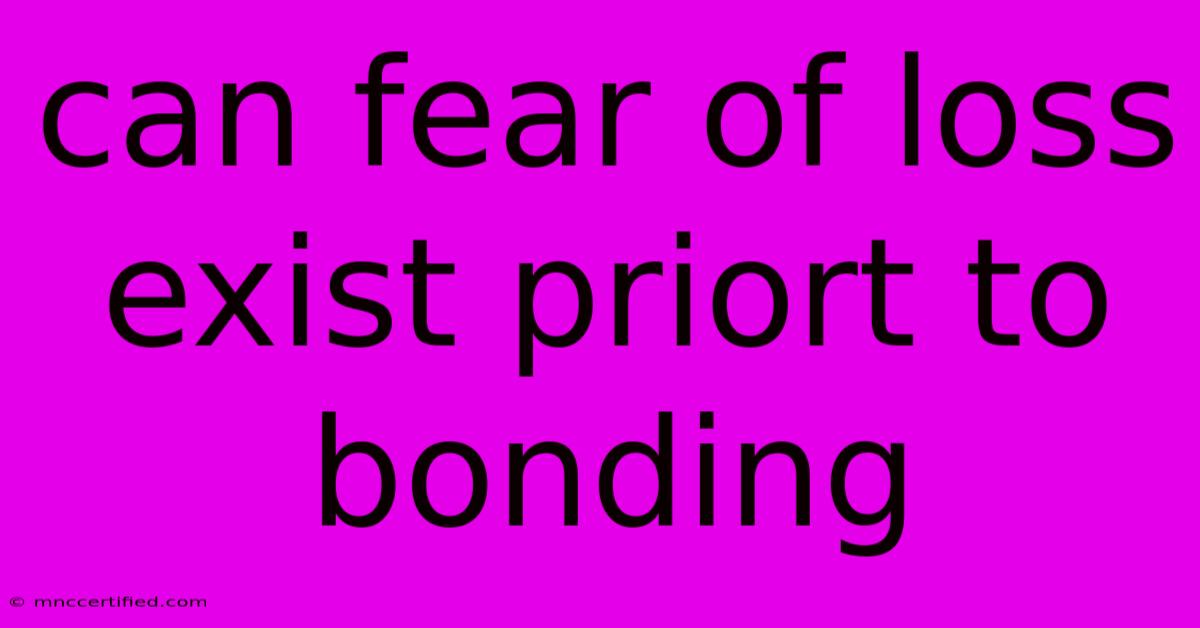Can Fear Of Loss Exist Priort To Bonding

Table of Contents
Can Fear of Loss Exist Before Bonding? Exploring the Intricacies of Attachment and Anxiety
The human experience is deeply intertwined with the concept of attachment. We crave connection, forming bonds with others that provide us with a sense of safety, security, and belonging. But what happens when this need for connection becomes intertwined with fear? Can we truly experience fear of loss before a bond has even been established?
This question delves into the complex relationship between attachment, anxiety, and the human psyche. While the idea of fearing something you haven't yet experienced might seem paradoxical, a closer look reveals nuanced insights.
The Nature of Attachment
Attachment theory, pioneered by John Bowlby, explains how our early experiences with caregivers shape our ability to form secure and healthy relationships throughout life. These early experiences, primarily during infancy, form an internal working model, a mental blueprint that guides our expectations and behaviors in future relationships.
This internal model influences how we perceive and react to potential loss. Those with secure attachment styles, nurtured by responsive and consistent caregiving, generally feel confident in their ability to form close bonds. They trust that their needs will be met, and they experience less anxiety when faced with separation or potential loss.
Conversely, individuals with insecure attachment styles, often stemming from inconsistent or neglectful caregiving, might struggle with trusting others and may feel a heightened sense of anxiety around potential loss. This heightened anxiety can manifest even before a bond has been established, driven by past experiences and a deep-seated fear of abandonment.
The Role of Anxiety
Anxiety, in this context, plays a crucial role. It acts as a warning system, signaling potential threats to our perceived security and well-being. While anxiety is a natural human response, it can be amplified in individuals with insecure attachment styles. Their heightened sensitivity to potential loss can lead them to anticipate or even preemptively fear the breakdown of a relationship before it even begins.
This anticipatory fear can manifest as a resistance to forming close bonds, a tendency to push away potential partners, or a constant hypervigilance for signs of rejection or abandonment. While this behavior might seem counterintuitive – why would someone fear a loss they haven't yet experienced? – it's often a subconscious defense mechanism designed to protect against perceived emotional vulnerability.
The Impact of Past Experiences
Understanding the impact of past experiences is crucial in understanding this phenomenon. Individuals with insecure attachment styles may have experienced childhood traumas like neglect, abuse, or instability. These experiences can lead to a learned helplessness, a deep-seated belief that they are inherently unworthy of love and that their needs will not be met.
This learned helplessness can color their perception of future relationships, leading them to anticipate rejection and fear loss even before the relationship has had a chance to blossom. It's as if their internal working model is predicting a negative outcome based on past experiences, creating a self-fulfilling prophecy.
Navigating the Complexity
It's important to remember that while the fear of loss might precede bonding, it doesn't necessarily determine the future of a relationship. With conscious effort and support, individuals with insecure attachment styles can learn to manage their anxiety and build healthy connections.
Here are some ways to address this fear:
- Therapy: Talking to a therapist can help individuals explore the root of their anxiety and develop coping mechanisms.
- Self-awareness: Recognizing the patterns and triggers associated with fear of loss is crucial for building trust and security in relationships.
- Communication: Openly communicating fears and anxieties with potential partners can foster empathy and understanding.
By addressing these fears head-on, individuals can break free from the cycle of anxiety and build fulfilling relationships based on mutual respect and trust.
In conclusion, while the concept of fearing a loss that hasn't occurred might seem paradoxical, it's a complex and nuanced phenomenon rooted in attachment styles and past experiences. Understanding the roots of this anxiety is crucial for building healthy and lasting relationships.

Thank you for visiting our website wich cover about Can Fear Of Loss Exist Priort To Bonding. We hope the information provided has been useful to you. Feel free to contact us if you have any questions or need further assistance. See you next time and dont miss to bookmark.
Featured Posts
-
Red Star Vs Barcelona Nov 6th Match Breakdown
Nov 07, 2024
-
Evidence Of Commercial Property Insurance
Nov 07, 2024
-
Mark Cubans If I Were 16 Again
Nov 07, 2024
-
Gold Bond Medicated Powder Kills Bed Bugs
Nov 07, 2024
-
Weeks To Live Trevor Sorbies Bowel Cancer
Nov 07, 2024